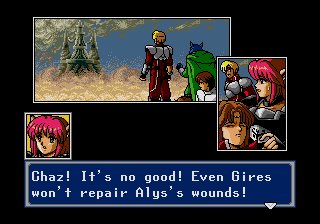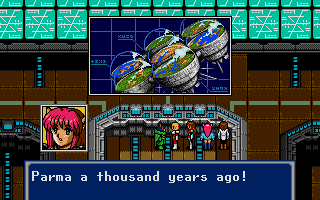|
|

|
BATTLE SYSTEM
|

|
INTERACTION
|

|
ORIGINALITY
|

|
STORY
|

|
MUSIC & SOUND
|

|
VISUALS
|

|
CHALLENGE
|
Solid
|
COMPLETION TIME
|
25-30 hrs
|
|
OVERALL
4.0/5
|
Rating definitions
|
|
|
The Genesis, while not a platform heralded for its commitment to RPG fans, managed to make a bold attempt for greatest RPG of the 16 bit era with Phantasy Star IV, a well-packaged and climactic finale to the classic series. This game is so far beyond any of its predecessors as to merit purchase from even the tightest of tightwads should Nintendo step up and add it to the Virtual Console lineup.
Battles are crisp and feature fully animated enemies and allies with detailed backgrounds. The auto battle command returns in the form of a macro, one of several character-programmed ally command sets, but for a refreshing change, simply telling all five party members to fight every round is rarely the fastest (or most judicious) method of winning a random encounter. Utilizing skills and magic techniques in conjunction with one another, as well as carefully selecting targets in order to maximize damage with attacks that target all enemies is a rewarding experience. Occasionally a particular combination of techniques will result in two or three party members acting in tandem, creating new double and triple techniques a la Chrono Trigger. Balancing MP consumption is crucial and well designed; casting a powerful attack spell one too many times may leave the party in a dire situation when it comes time to heal. Adding further complexity is the interesting mechanism of maintenance of cyborg party members. Cyborgs are not healed with spells, and cannot be revived if disabled in battle, but automatically revive after battle, regain HP with each step, and are capable of repairing themselves on command. In all the battle system is complex enough to satisfy without overwhelming casual genre fans.
 If only someone knew REVER!
If only someone knew REVER!
|
|
The story, often told through stunning-for-the-time cinematic cutscenes, is extremely well localized. Characters’ individual personalities shine through with an English script possibly better than anything to come out of Japan in its generation. Unfortunate, however, was the decision to retain the obtuse naming of spells and techniques. Items typically come with vague descriptions, and magic and skills come with none at all. It’s pretty easy to pick up Final Fantasy VI and guess what will happen if you cast “Fire 2.” Am I really supposed to know what skills like “Warla” and “Efess” are useful for? Not only must the player learn this by trial for every spell and skill, but then keep track of them all. It’s a detraction worth noting.
The plot is a series best, featuring unexpected twists and (gasp!) well developed characters with distinct personalities. Tie ins with predecessors actually go back and retroactively make even Phantasy Star III look cool. The only downside is, of course, that you’ll have to suffer through prequels ranging from uninspiring to putrid to truly appreciate the plot elements of PSIV.
The music gets the job done, and the battle theme is at least not unpleasant to listen to. The best and most memorable track is played when the party decides which planet to rocket off to from one of the games many space ports. Graphically you won’t find much better than this on the Genesis. Spell effects are big and bold; enemies animate ferociously while attacking, morphing, and sometimes teaming up or combining; and screen-filling bosses are highly satisfying to smash into dust.
 Gah! Not a Phantasy Star III reference!
Gah! Not a Phantasy Star III reference!
|
|
Random encounters have been tamed to a more reasonable rate, and being considerably more engaging, seem less tedious than the average 16 bit RPG. The majority of the very solid challenge of this game comes from the staggering boss fights, made more painful by the lack of in-dungeon save points. Without knowing beforehand which techniques will prove most effective, turns may be wasted and characters quickly incapacitated. When these wars of attrition with the many incarnations of series staple Dark Force are won by the party, it is not uncommon to have one party member on his or her last leg left to mop up all the experience.
The game is not overly long, but is complete and satisfying. Hunters guild quests provide the party with a little extra loot and a few optional fights, and at least two optional dungeons outfit two main characters with unparallel equipment and a powerful magic spell late in the game.
I don’t know if it was budgetary or creative constraints that prevented every Phantasy Star title from being as polished and rewarding as PSIV, but this is a game to be experienced.. Many RPG fans passed over the Genesis in favor of the better-supported SNES. In this day and age of classic rereleases, this is not a title to be missed twice.
Review Archives
|









